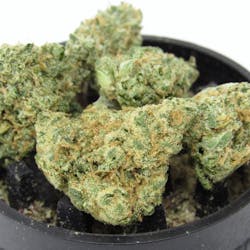Most people know that THC, or tetrahydrocannabinol, is the chemical compound in cannabis responsible for a euphoric high. But what more is there to know about cannabis’ primary psychoactive component? Whether the question comes as a newbie to the cannabis world or an experienced consumer who would like to know a bit more about the most famous of cannabinoids, THC has likely been synonymous with cannabis in your mind for as long as you’ve known about the plant.
Let’s dig a little deeper into what THC is and how it works.
THC is a cannabinoid, but what’s a cannabinoid?

The first step to understanding THC is to understand cannabinoids. Cannabinoids are chemical compounds found in the cannabis plant that interact with receptors in the brain and body to create various effects. There exist dozens, and potentially more than 100, cannabinoids in the cannabis plant, but THC is most widely known among these due to its abundance and euphoric attributes.
The isolation of THC came from an Israeli chemist by the name of Raphael Mechoulam. In 1964, Mechoulam isolated and synthesized THC from Lebanese hashish, marking the beginning of cannabis research that would lead to the discovery of many other cannabinoids, cannabinoid receptors throughout the body, and “endocannabinoids” – the THC-like compounds our body naturally produces to maintain stability and health.
Why does cannabis produce cannabinoids? Cannabinoids are known as secondary metabolites, which means they are chemicals the plant produces that have no primary role on the plant’s development. However, the leading hypothesis is that secondary metabolites act as an immune system for the plant, fending off predators, parasites, and pests.
Because humans (and many other animals) have receptor systems that THC binds to, we can also reap the benefits of cannabinoids for both health and enjoyment. This system, called the endocannabinoid system (or ECS), is a group of specialized signaling chemicals (think “keys”), their receptors (think “locks”), and the metabolic enzymes that produce and break them down. These endocannabinoid chemical signals act on some of the same brain and immune cell receptors (CB1 and CB2) that plant cannabinoids like cannabidiol (CBD) and Δ9-tetrahydrocannabinol (THC) act on.
How does THC produce its effects and get us high?

Simply put, THC works by binding to cannabinoid receptors concentrated in the brain and central nervous system to produce intoxicating effects. But does that mean our bodies evolved for cannabis?
Well, not quite. Before envisioning a symbiotic relationship between cannabis and humans, it’s important to be introduced to “endogenous cannabinoids” such as anandamide and 2AG – the human body’s naturally occurring cannabinoids. You may be familiar with anandamide if you’re, say, a runner and have experienced the wave of euphoria after a successful jog, commonly known as “runner’s high.”
The bottom line? Our bodies evolved to interact with natural cannabinoids such as anandamide, but this same system is responsible for the effects experienced from THC and other cannabinoids.
What to expect from a THC high

THC has a wide range of short-term effects which may or may not be experienced depending on the individual. For example, while some may find that THC elicits strong feelings of calm and peace, others may notice an increase in their anxiety levels. The difference can be as simple as one’s own body chemistry, but certain strains and varying concentrations of THC can also create different outcomes in how one feels.
If one cannabis strain elicits unpleasant feelings, another may be just the right medley to induce a very enjoyable sensation. Consider consulting a thorough strain database to find what’s right for you, and as always, it’s wise to “start low and go slow” – consume a little at a time and then wait to see how you feel. Remember, a cannabis high can last for a few hours, but it will wear off.
Some short-term effects of THC include:
- Elation
- Relaxation
- Sedation
- Pain relief
- Memory impairment
- Energy
- Hunger
- Drowsiness
- Increased heart rate
- Dry mouth
- Red eyes
- Slowed perception of time
- Laughter
- Dizziness
- “Couch-lock,” or feeling heavy
- Anxiety/paranoia
What are the risks and long-term effects of THC?

There is very little concrete evidence to support theories about the long-term effects of THC. Research is ongoing and inconclusive, and with time, some of the prevailing theories may be confirmed or ruled out entirely. That said, research into the long-term effects of THC currently includes the following potential effects.
Anatomical Brain Changes: In a recent study, researchers found a link between frequent high-THC consumption and anatomical alterations in a region of the brain called the corpus callosum, which connects the two cerebral hemispheres. Using data from participants who self-reported their cannabis use, researchers found that daily consumers of high-potency THC strains showed differences in corpus callosum microstructure compared to occasional consumers and those who had never consumed cannabis. However, the anatomical differences between frequent consumers of high-THC cannabis and the other groups could not be linked with psychosis, which was another key variable that researchers in this study considered. In addition, it’s important to note that due to the self-reported nature of this study, there is no independent verification of the accuracy of these results.
Bronchitis: A result of smoking in general, these symptoms can be thwarted by choosing alternative consumption methods, such as vaporization.
Memory: A study from March 2016 suggested a decrease in verbal cognitive function over an extended period of consistent cannabis consumption. For every five years of cannabis use, participants were found to lose memory of one word from a 15-word list. However, this study had a very small sample size of long-term cannabis users, so it’s difficult to know how conclusive their findings really are. In addition, once again, cannabis use was self-reported, so there’s no independent verification of the accuracy of how frequently subjects consumed cannabis.
Psychosis: Only truly a concern for those predisposed to certain psychotic conditions such as schizophrenia and other such disorders, research has found the onset of symptoms may develop an average of three years earlier with regular cannabis use.
Tolerance: The body naturally builds up a tolerance for THC with extended, long-term use. The downside to this is that increased levels of consumption will be required to achieve the desired effects. A simple solution? Tolerance breaks.
Beyond these studies, there is little known long-term risk to THC/cannabis use. The following are some things you do not have to worry about, based on research.
Cancer: There is no consistent evidence to support an increase in cancer risk (lung or otherwise) with THC consumption. However, smoking should be avoided as inhaling smoke does carry health risks.
Overdose: There has never been a documented cannabis overdose or risk of death. It would be virtually impossible to fatally overdose.
What are the medicinal effects of THC?

There are a variety of conditions for which THC may offers benefits:
- PTSD
- Neuropathic and chronic pain
- Insomnia
- Nausea
- Inflammation
- Arthritis
- Migraines
- Cancer
- Crohn’s disease
- Fibromyalgia
- Alzheimer’s disease
- Multiple sclerosis
- Glaucoma
- ADHD
- Sleep apnea
- Appetite loss
Cannabis research remains in the early stages, and it is very likely that as this research continues to gain traction and grow with the advancement of legalization, our understanding of how THC and other cannabinoids can be utilized for the treatment of these and other conditions will expand. New research continues to emerge consistently.
THC vs. CBD: What’s the difference?

The main difference between THC and CBD, both of which are very popular cannabinoids, is in their perceived effects. THC elicits strong cerebral euphoria, while CBD lacks intoxicating effects altogether. This basically comes down to the fact that THC activates CB1 receptors in our brain while CBD does not. CBD’s subtle effects are primarily felt in pain, inflammation, and anxiety relief, as well as other medicinal benefits.
What are the different ways to consume THC?

There are myriad ways to consume THC, the most common and obvious being smoking. Decarboxylation (which occurs with heating) is the key to enjoying THC, and this holds true whether one intends to smoke it or eat it. In its raw form, cannabis is non-intoxicating, with its primary cannabinoid being THCA. However, by applying heat, either when lighting it in a pipe or cooking it into oil, the THCA is converted to THC, and then the magic can begin.
There are plenty of different ways to enjoy THC. Consider your options and choose the method that is right for you and/or any conditions you may be treating.
With so much to be said about THC, the above information may act as a good jumping off point for the inquiring mind, and in time, as research continues to grow and expand, there will surely be much more to learn and understand.




